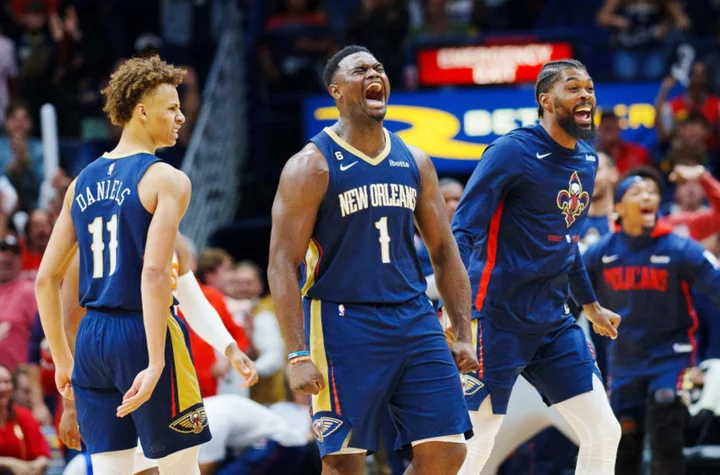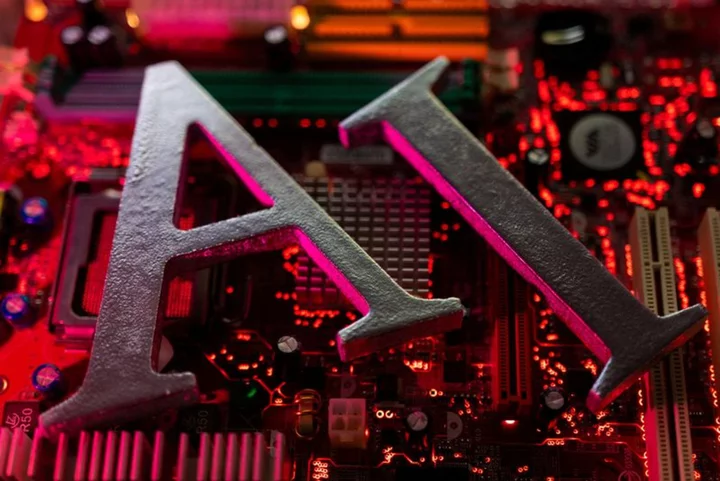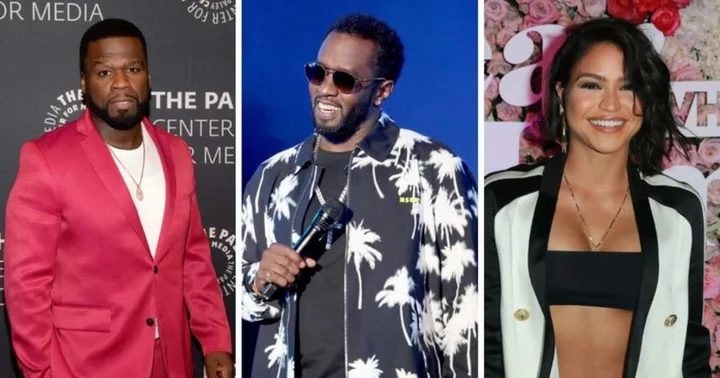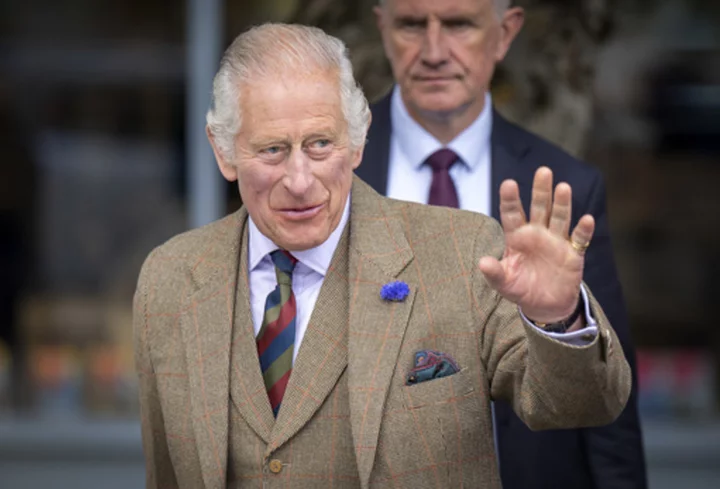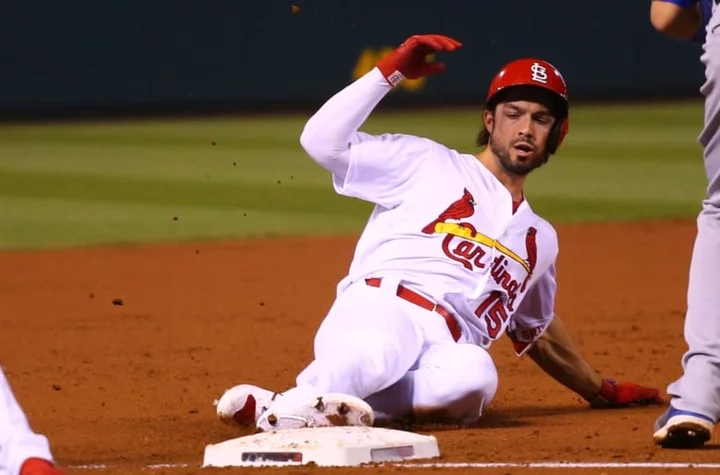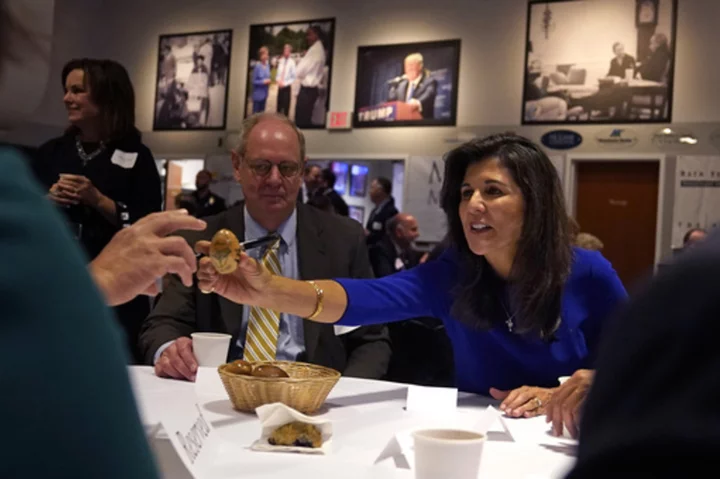The New Orleans Pelicans were supposed to take the next step last season. Instead, it ended with a deflating play-in loss to the comically young Thunder. With another Zion Williamson season lost to injury, there seem to be more questions than answers about the Pelicans' future right now.
And yet... on paper, this Pelicans team is a contender. Have we forgotten how good a healthy Zion Williamson is? Brandon Ingram is an All-Star. CJ McCollum is better than your average third wheel. The depth? Virtually unmatched. NOLA is stacked with young talent and a treasure trove of future draft picks — more than enough to swing a blockbuster trade, if the circumstances are right.
New Orleans probably won't get in the Damian Lillard mix. James Harden? Yeah, no, probably not. But David Griffin is battling a ticking clock in the front office. Another dud season with Zion on the roster could lead to a permanent end to that relationship. Another dud season, and maybe Griffin starts to feel a bit of warmth on the bottom of his seat.
Willie Green had the Pelicans in the playoffs in 2021. The blueprint has already been laid out. If Williamson can stay healthy, it's difficult to imagine the Pelicans not stacking a fair amount of wins. Even if Zion can't stay healthy, however, the Pelicans' depth should be enough to steer them toward a better outcome than last season.
Here's what Green is working with rotationally. It's an impressive bunch, with several potential breakout candidates. Here's to hoping it can all, finally, come together in 2023-24.
New Orleans Pelicans starting point guard: CJ McCollum
CJ McCollum is probably underrated at this point. Sure, he has aged out of the stardom he once achieved in Portland, but McCollum remains a potent scorer and even-keeled playmaker who is perfectly suited to New Orleans' unique offensive personnel. He's the point guard, but McCollum spends plenty of time stretching the defense with his off-ball movement and deadly spot-up jumper.
The Pelicans will run a lot of actions through Zion Williamson and Brandon Ingram, allowing McCollum to avoid overly burdensome responsibilities as he enters the next stage of his career. When asked to handle the rock and create for others, McCollum still has juice. He's naturally inclined toward the mid-range pull-up and he's a smooth operator out of pick-and-rolls. McCollum averaged 5.7 assists (and only 2.4 turnovers) last season.
His 20.9 points on .437/.389/.769 splits will get the job done. McCollum's versatile skill set allows him to thrive with various personnel groups. The defensive limitations are becoming more prominent, but he's the only negative-defense small guard getting minutes. The Pelicans have length at every position and can comfortably mask McCollum's presence in stressing matchups.
McCollum has roughly three years and $100 million left on his contract. That's a big chunk of change — maybe too much — but the Pelicans are committed and hey, McCollum will help them win a lot of games over the next three years if the team around him holds up.
Primary backup point guard: Jose Alvarado
Jose Alvarado has become a beloved fan favorite not only in New Orleans but all over the country. The dude scraps. He's every bit of 6-foot-nothing and 179 pounds. He wages war at the point of attack on every possession, getting in his stance and wedging his slender frame up under the opposing ball-handler. Alvarado averaged 1.1 steals in 21.5 minutes last season.
The offensive numbers are less impressive. Alvarado only hit 33.6 percent of his 3-point attempts and he's not much of a pull-up threat. He's a below-the-rim finisher too, with middling efficiency around the paint. But it generally doesn't matter. He possesses such a gift for chaos on the defensive end that it's impossible for New Orleans to keep him out of the lineup. He impacts winning by sheer force of will.
Other players who could receive minutes at point guard: Kira Lewis Jr., Dyson Daniels
New Orleans Pelicans starting shooting guard: Brandon Ingram
Is Brandon Ingram also underrated at this point? The Pelicans' god-awful season overshadowed Ingram's individual success. He averaged 24.9 points, 5.5 rebounds, and 5.8 assists on .484/.390/.882 splits in 34.2 minutes. He approached or exceeded his career-high marks in every category, frequently operating as the Pelicans' No. 1 option in Zion's absence.
The former No. 2 pick continues to add to his repertoire with each passing season. His 3-point shot has developed from a weakness into a strength. His high release point makes him especially deadly on mid-range pull-ups, while his length and footwork make up for limited strength at the rim. And that strength isn't as limited as it once was. Ingram still maintains the string-bean physique that earned him so many errant Kevin Durant comps at Duke, but he's no longer a complete toothpick.
That shows up most evidently on the defensive end. Ingram can handle difficult matchups on the perimeter and put his 7-foot-3 wingspan to good use away from the ball. Depending on who starts next to him on the wing next season, Ingram's burdensome offensive role could be paired with heightened defensive responsibilities. He's up to the task.
Ingram's versatility on offense is what ultimately makes him a perennial All-Star candidate. Ingram can handle the ball and run the offense, using his high vantage point to peer over the defense to make advanced passing reads out of the pick-and-roll. He can weaponize his height to score over smaller defenders or use his speed to scoot around slower defenders. Put him off the ball, and Ingram will comfortably bomb 3s. He can play initiator, connector, or finisher. He's still very, very good, folks.
Primary backup shooting guard: Dyson Daniels
Dyson Daniels was a victim of the Pelicans' depth as a rookie. He managed 17.7 minutes per game with averages of 3.8 points, 3.2 rebounds, and 2.3 assists on .418/.314/.650 splits. One glance at the numbers and it wouldn't be hard to brush Daniels aside and forget about him. That would be a mistake.
The former No. 8 pick is due for a major second-year leap. The offensive numbers will still remain limited — Daniels doesn't create his own shot very often and he's a mediocre shooter — but he's a wizard passing the ball, his head constantly on a swivel with the advanced processing speed of the most cutting-edge computer model. He's going to make the extra pass and make a point to elevate those around him. The Pelicans have finishers; Daniels will connect the dots.
Where Daniels really shines, however, is the defensive end. He's 6-foot-6 and pesky in passing lanes with a 6-foot-11 wingspan that ball-handlers have a tough time navigating at the point of attack. New Orleans already has a defensive specialist who can't shoot, so Daniels' jump shot progress is essential, but he's going to be a high-level role player.
Other players who could receive minutes at shooting guard: Jordan Hawkins, CJ McCollum, Trey Murphy III, Kira Lewis Jr.
The Pelicans burned the No. 14 pick in June's NBA Draft on Jordan Hawkins. It was a debatable use of such a high pick, but Hawkins led UConn to the NCAA championship with his torrid outside shooting. He's probably the best movement shooter in the draft and that skill alone could be enough to make him a valuable rotation cog — especially for a team built around a paint force like Zion.
New Orleans Pelicans starting small forward: Trey Murphy III
The Pelicans have a tough decision to make here, but Trey Murphy is on the verge of his NBA breakout. The Virginia product averaged 14.5 points and 3.6 rebounds on .484/.406/.905 splits in his sophomore season. That was already a considerable leap in production compared to his rookie year, with Murphy starting in 65 of 79 appearances due to Zion's absence. Well, even with Zion back in the mix, it's hard to imagine Murphy relinquishing his starting gig.
Murphy's baseline appeal was always his 3-and-D attributes. He's a strong, wiry 6-foot-9 wing who can absolutely torch the net. He averaged 6.3 attempts from 3-point range in 31.0 minutes last season. Murphy is the Pelicans' most reliable volume shooter, which in and of itself is enough to guarantee him a major role.
That said, Murphy's ability to go beyond his 3-point bomber reputation is what makes him such a prime 'Most Improved Player' candidate. The Pelicans will have a lot of mouths to feed, but there has been plenty of "potential star" chatter around Murphy. It's largely due to his remarkable efficiency as a shooter, but he's also becoming a dynamic driver. Defenders often find themselves rushing to close out on Murphy. At 6-foot-9, he's proving more and more comfortable attacking those errant closeouts and making strong moves to the rim. If that progress continues — and it will — Murphy is going to be one heck of a fourth option.
With a 7-foot wingspan and underrated strength, Murphy is also quite the defender. He's a genuine two-way force. While he doesn't have the same on-ball proficiency as New Orleans' other option here, Murphy can handle difficult assignments and the Pelicans will simply have too much length for most offenses to effectively deal with.
Primary backup small forward: Herb Jones
Herb Jones has started 135 of 144 games since being selected with the No. 35 pick in the 2021 NBA Draft. That's not normal, and it's a testament to Jones' unique proficiency on the defensive end. He's the rare perimeter rookie who provided elite defense straight out of the gates. Jones is a next-level defensive playmaker, blessed with preternatural instincts and magnetic hands at the end of his 7-foot wingspan.
Jones is the Pelicans' top answer to the NBA's elite offensive creators, but he's equally — heck, more — dominant away from the ball. Jones is a deflection fiend who can completely take over possessions with his activity as a roamer. It's like the opening of The Batman, when all the criminals are running around Gotham looking at shadows with a deep sense of foreboding. That's how NBA passers feel when Herb Jones is on the floor.
The primary hangup with Jones, and the reason he will probably lose his starting spot to Murphy with the entire group healthy, is offense. Jones doesn't shoot well enough to command significant respect yet. He was 33.5 percent of 2.5 attempts from 3-point range last season, so there's a decent foundation in place, but the volume and percentage both have to improve.
Other players who could receive minutes at small forward: Brandon Ingram, Naji Marshall, Dyson Daniels
New Orleans Pelicans starting power forward: Zion Williamson
Zion Williamson has been a source of controversy off the court for myriad reasons, some more valid than others. The conditioning concerns are real. Williamson has played over 60 regular season games once in four years. There aren't many players built like Williamson, and none stress their knees/ankles/feet in the way Zion does with his atomically explosive leaping force. He does need to work harder than most to keep his body in peak physical shape.
For the first time, this summer involved genuine Zion trade rumors. There were reports that the front office legitimately mulled over the possibility of moving on from the former No. 1 pick, which would have been unthinkable even a year ago. Fans are growing restless, as is the organization. All that is understandable.
At the end of the day, however, Zion is one of the best players in the NBA. Straight up. Injuries have robbed him of appearances, but he has never been less than elite when on the court. Williamson is impossible to keep away from the rim, and he's impossible to stop once he gets there. Teams actively sag off Williamson at the 3-point line and it doesn't matter. He's unreasonably quick for a 6-foot-6, 284-pound forward. Zion's first step and subsequent ability to change direction is unmatched at his position. Add in the brick wall of muscle and ability to walk on air, and you have the league's best under-seven-foot rim finisher.
Williamson doesn't just score either. He operates as the Pelicans' lead ball-handler, kickstarting fast breaks off the rebound or initiating the halfcourt offense with his constant rim pressure and underrated passing chops. He's a unique offensive hub, the sun around which a healthy Pelicans offense orbits. The Pelicans, at full strength, will score more points than 90 percent of the league. It's a given. Williamson will make a lot of preseason player rankings look terribly nearsighted if he can stay on the floor.
Primary backup power forward: Naji Marshall
Naji Marshall has emerged as a rotation staple for the Pelicans, who should have no shortage of quality wing defenders next season. Marshall is built strong at 6-foot-7, capable of handling bulkier wings on defense and splashing a few 3s on offense.
The numbers don't leap off the page — 9.1 points, 3.6 rebounds, 2.5 assists on .433/.303/.789 splits in 23.3 minutes — but Marshall does the dirty work, screening and cutting on offense, making the extra pass, and leaning into the confines of his role. On defense, he's pure hustle. Marshall isn't the flashiest Pels player, but he will earn his chunk of minutes.
Other players who could receive minutes at power forward: Larry Nance Jr., Trey Murphy III, Herb Jones, Brandon Ingram
New Orleans Pelicans starting center: Jonas Valanciunas
Jonas Valanciunas is past his prime, sure, but he's still a force in the paint. The 31-year-old averaged 14.1 points and 10.2 rebounds on .547/.349/.826 splits in 24.9 minutes last season. His playing time was noticeably down from the prior season (30.3), even with Zion mostly out of the mix, but the Pelicans should remain confident in JV as a starter.
There is definite spatial overlap between Zion and Valanciunas. Those two haven't gotten a proper runway to develop in tandem, but Valanciunas is naturally geared toward the post. Zion scores all his points in the paint. That doesn't mean the partnership is doomed to fail, however. We have seen Zion get along just fine with non-spacers in the past. Valanciunas can space out to the 3-point line, and there's some potential for synergy in two-man actions.
Valanciunas is a monster screen-setter. He's just plain massive — 6-foot-11 and 265 pounds — and unafraid to throw his weight around. Williamson will spend the bulk of his minutes as the Pelicans' de facto lead ball-handler. Expect a lot of snug pick-and-rolls or instances where Valanciunas sets a screen near the halfcourt line to get Zion running downhill, not unlike what Houston used to do with James Harden and Russell Westbrook.
Valanciunas remains quite versatile working off of screens. He can pop out for jumpers, dive to the rim and finish, or he can make the right passing read on the roll. Valanciunas' ability to operate as a passer and DHO hub around the elbow has beared fruit with McCollum and Ingram on countless occasions already.
Primary backup center: Larry Nance Jr.
Larry Nance Jr. is one of several New Orleans rotation pieces who doesn't get enough credit. His numbers don't pop — 6.8 points, 5.4 rebounds on .610/.333/.696 splits in 21.2 minutes — but Nance does the little things. He's undersized for the center position at 6-foot-7, but he plays comfortably above the rim and provides New Orleans' playmakers with a regular lob threat in the non-Zion minutes.
On defense, Nance can comfortably guard in space and switch onto the perimeter. The Pelicans have the ability to toggle between different schemes with their centers. Valanciunas operates exclusively in drop coverage but can handle beefier scorers in the paint. Nance can handle quicker fives who like to spread the floor. That's important malleability for Willie Green's rotation.
Other players who could receive minutes at center: Cody Zeller, Zion Williamson

